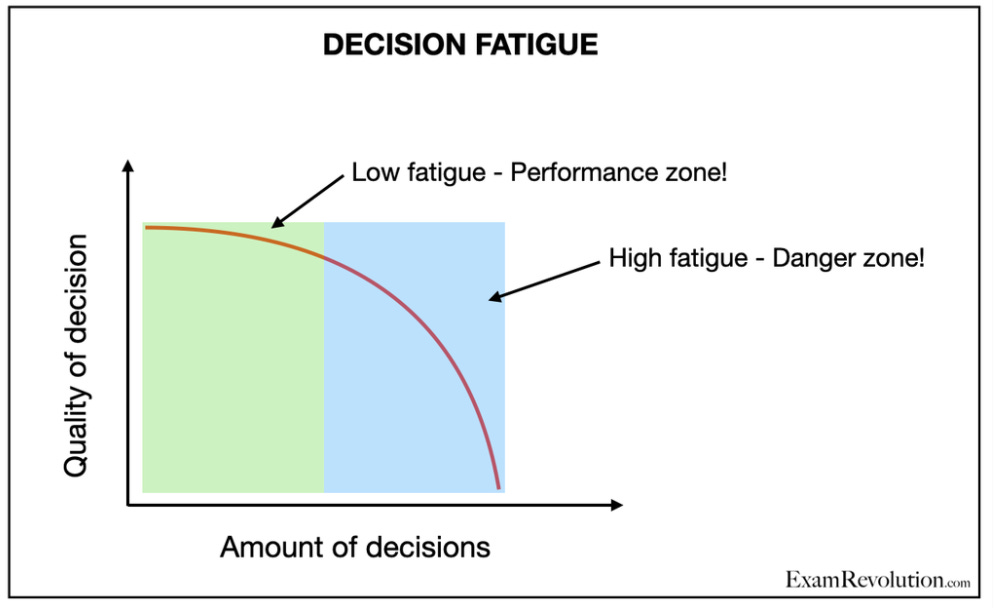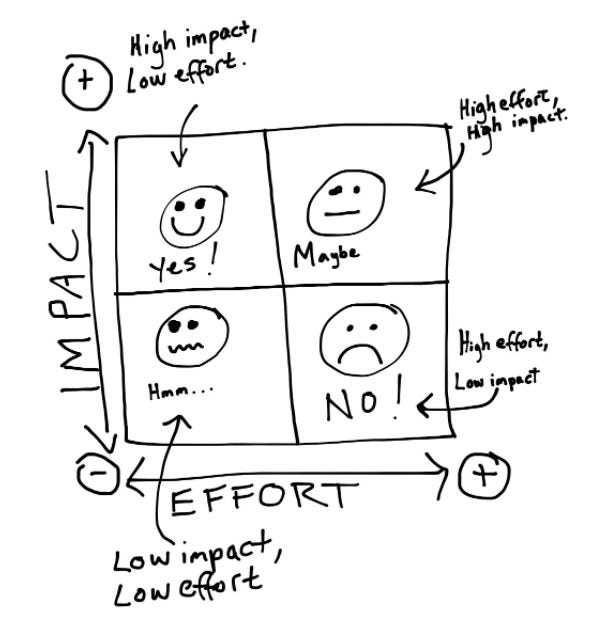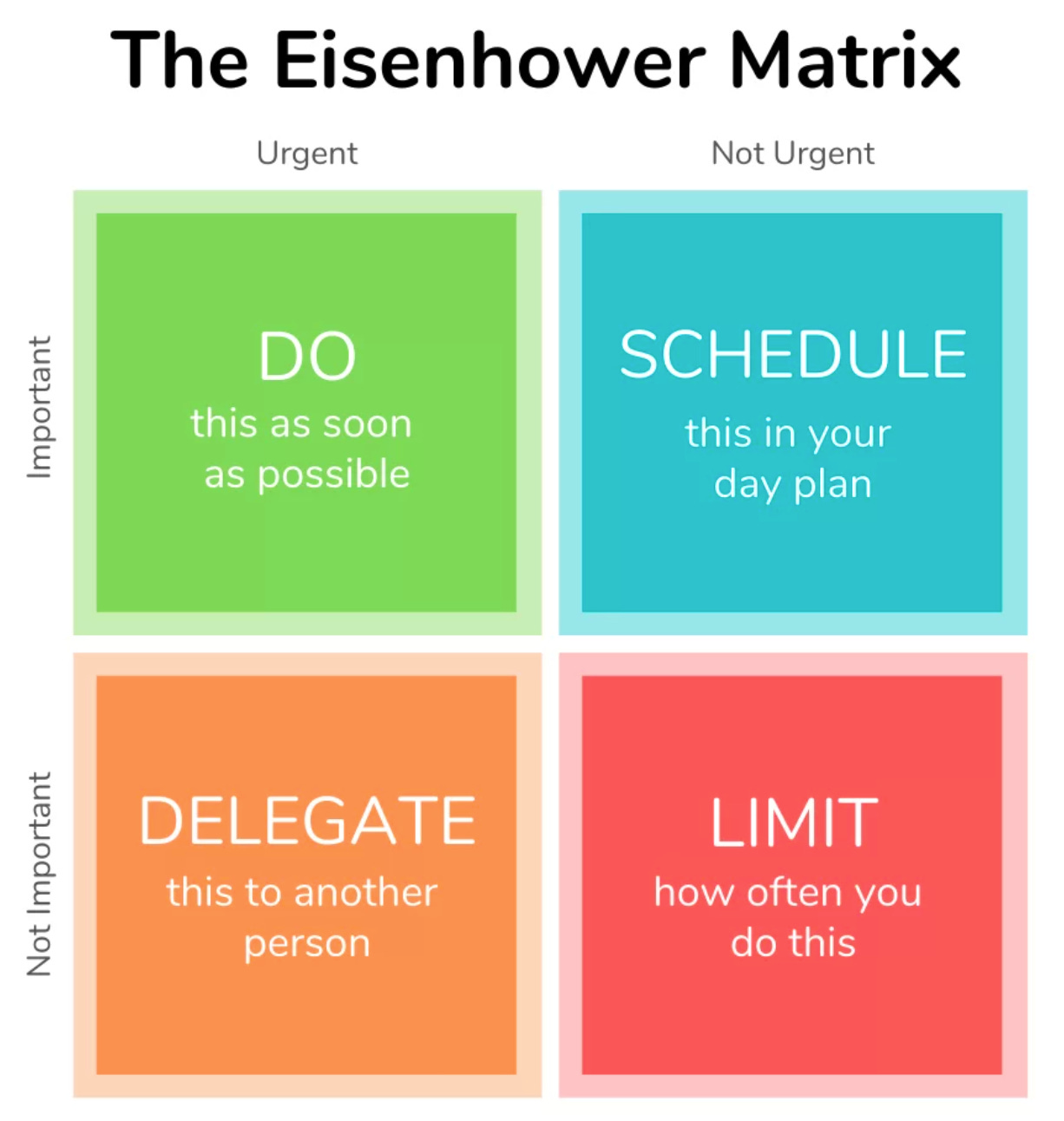Today I am going to talk about something that is going to help you make better decisions.
And.. save you time and energy in the process.
Even though it might not seem like it will help at first.
Trust me.. it will over time.
What is it?
Well.. let’s start with a story.
Since I was a kid I was obsessed with making the right decision in every situation.
I studied different decision making techniques and applied it to every decision I had to make.
Of course, as a kid, I didn’t have a lot of responsibilities, so I viewed decision making as a game.
As an adult, I quickly learned that things are different, I realized few things:
I have more responsibilities
The numbers of decisions I have to make has increased significantly
Decisions have high stakes (aka it’s not a game anymore)
I specifically remember the year when I got promoted to be a manager and lead a team.
Suddenly, I had so many things on my plate, and so many decisions to make that I quickly felt overwhelmed.
I shared my feelings with one of my mentors, and to my surprise, it took him 30 seconds to diagnose me. I remember it clearly, he said:
“Well.. it is pretty obvious. You are suffering from decision fatigue. You need to manage yourself, and your own energy before you approach any decision. When you learn how to do that, you’ll feel better.”
That was the first time I heard about decision fatigue, so I started to do my own research and fast forward to today, I can say that understanding decision fatigue completely changed the way I think about decision making and how I approach my day to day.
So.. without further ado, let’s dive into what decision fatigue is, why you should care, and what do you need to do to avoid it in your journey to make better decisions.
What is Decision Fatigue?
Decision fatigue is a mental and emotional state of exhaustion caused by making too many decisions over the course of a day.
To simplify, the more decisions you have to make during the day, the more tired you are going to get and as a result, the quality of your decisions is going to suffer.
Imagine for a moment that decision making is a game, and everyday you start your day with the mental ability to make 10 good decisions.
If during the day you have to make 20 decisions and your mental capacity is to handle only 10 decisions, then, at the end of the day you’ll likely feel exhausted, overwhelmed, anxious and the quality of those 10 additional decisions is going to suffer.
If you prefer charts and visual examples, like me 🤓, take a look at the chart below. The chart shows that the quality of decisions decreases as the amount of the decisions you have to make increases in a single day.

Keep in mind!
Every person is different, so the number of good decisions each person can make is different. That being said. If you know you have a limit number of good decisions you can make everyday, make sure you don’t waste that on simple decisions such as: “do I wear a black shirt or a white shirt”.
Although not all decisions are made equal, every decision that you make takes a toll on you. Even if you are contemplating between eating eggs in the morning or making toast, that will cost you some decision making points.
So, why should you care?
Mental health. Decision Fatigue leads to stress, anxiety, exhaustion and physical fatigue. If you ignore it, it can easily make you angry, unhappy and even lead to a burnout.
Avoid making the wrong decisions. When you exceed your daily decision making capacity, each decision becomes harder and harder. Then, your brain looks for shortcut traps leading you to make the wrong decisions. Typically there are 2 types of shortcuts traps:
Impulsive decision. This one is irrational. Your brain pushes you to take action without thinking things through. Your brain will tell you things like: just do it, what’s the worst thing that can happen, just click the send button, or post this thing on social media, it’s ok not to review it.
No decision. You are so tired that your brain encourages you to avoid any decisions altogether to save energy. As a result you might miss out on a good opportunity.
Your performance at work can suffer. Decision Fatigue can cause you to make the wrong decisions and look overwhelmed all the time. As a result, you might miss an important detail, a big opportunity or even your next promotion.
Creative Thinking. Being overwhelmed and exhausted won’t allow you to do any creative thinking. You have to manage your mental decision making capacity to allow time for creativity.
Work/Life balance. If you want to have a good work/life balance, you should pay attention to decision fatigue and try to avoid it at all costs. Managing your energy in the right way will allow for more free time and better work/life balance.
How to Avoid Decision Making Fatigue?
Prioritization. Not all the decisions are made equal. Focus on the decisions that matter. Here are few different models that can help with prioritization:
High Impact / Low Effort decisions. You can divide all your decisions or tasks to effort vs. impact (see chart below). Start with high impact / low effort decisions, then move slowly towards high impact high effort decisions.. Make sure to avoid high effort, low impact decisions.
Urgent vs. important. (the Eisenhower model). You can divide all your decisions or urgent vs. important (see chart below). Focus on urgent and important and try to automate or delegate the rest.
Automation. You should try to automate as many decisions as you can both in your personal life and at work. I’d focus on automating low impact decisions (so you can spend more time and energy on high impact decisions). Here are few examples of decisions you can automate:
Personal life examples: eat the same breakfast everyday, set your bills on autopay, create recurring calendar reminders, wear the same color suit as president Obama said to Vanity Fair in 2012 “I generally wore only gray and blue suits in order to pare down decisions”
Work examples: use tools like Zapier or IFTTT to automate existing manual processes.
Protect your time. Don’t think about decisions till you have to! And don’t postpone decisions that you can make right now.
Rule-Based Approach. You should create a set of rules for yourself to help you make decisions quicker, it will save you time and energy. Here are few examples:
Don’t send emails after 6pm, you can write it, review it in the morning and send it in the next day
Don’t make big decisions after 6pm
Drink alcohol only on the weekends and not during the work week
Don’t think twice about a purchase that can make you happy if it’s below $X amount (whatever amount you are comfortable with)
Try not to go back to decisions you’ve already made
Delegate. If you are in a position to delegate, delegate some of your low impact decisions.
Routines. Make sure you develop routines that can save your decision making energy.
Make 1 big decision instead of 100 small ones. Legendary Peter Drucker suggested: In certain situations where you have to make a lot of small decisions, sometimes you can just make 1 big decision instead of 100 small ones. Here are few examples:
Hire or delegate. If you have to make many small decisions at work on a daily basis on a specific topic, you can decide to delegate, hire or outsource the work to someone else. Here are a few easy to use freelancer outsourcing platforms that I like: Fiverr, Upwork.
Study a topic yourself. If you rely on other people to provide you answers on a specific topic, you can decide to study the topic yourself. There are fantastic platforms out there where you can learn pretty much anything. For example: LinkedIn Learning, Coursera.
Cleanse your phone. Let’s say you are spending way too much time on your phone or social media apps and you don’t have time to read or be present with your loved one. You can decide to delete all your apps in your phone, and that will help you find time. I've done it, it works!
Make decisions in the morning. Research shows that it doesn’t matter if you are a morning person or an evening person, male or female, people make better decisions in the morning.
I hope that one of the decisions you made today is to read this post, and I hope you read it in the morning 😉
Also, I’d love to hear from you. What is the 1 big decision that you can make today to avoid 100 small ones.
p.s. take a look at the bonus section 👇
Bonus Section: My morning routine! ☀️
I wanted to share with you my morning routine. This routine helps me automate some of my decisions in the morning and eliminate decision fatigue during the first half of the day:
Wake up 5:00am (unless it’s the weekend).
Exercise 5:00-5:30am (planned in advance).
Getting ready 5:30-6:00 (clothes are ready).
Coffee 6:00am.
Writing/Journaling 6:00-7:00am.
Breakfast 7:00am (oatmeal).
Emails 7:00-8:00am.
✍🏻 What I wrote in February & March
Most underrated secret of success
The 1 thing you can do to become a better leader
How to manage up your meetings with your boss?
How to prepare for paternity leave, support your partner and your team?
That’s it! thank you for reading. Per usual, let me know if you have any thoughts and have a fantastic week! 🙌



